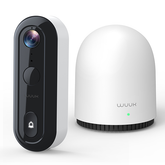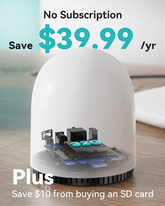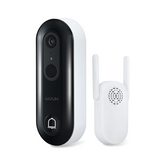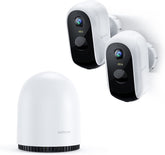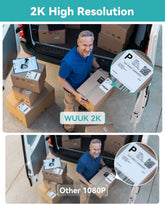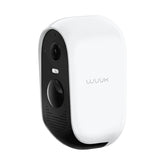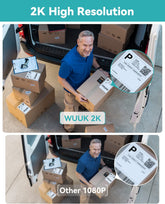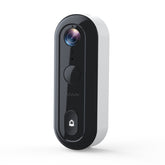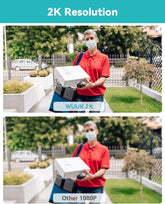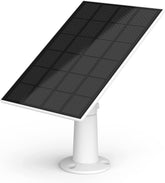2023 In-depth Guide to Solar-powered Security Cameras
In modern times where safety and security are of paramount importance, technological advancements have unlocked a range of effective solutions. Among these, security cameras remain a popular and efficient choice. However, as we grow increasingly environmentally conscious and grapple with rising energy costs, sustainable and cost-efficient alternatives are in demand. Enter solar-powered security cameras, a harmonious blend of cutting-edge technology and sustainability. This comprehensive guide will delve into the world of solar-powered security cameras, explaining their functioning and features and offering guidance on making the right choice for your needs.

What are Solar-Powered Security Cameras?
Solar-powered security cameras are surveillance devices fueled by solar energy, substituting the need for traditional electricity supply. These devices embody two integral components: the surveillance camera and a solar panel. The solar panel's primary role is to harness sunlight, converting it into electricity to power the camera's capture and recording of surveillance footage.
Can Solar-Powered Security Cameras Work on Cloudy or Rainy Days?
Yes, they can run in less ideal conditions. Solar panels can still absorb and convert diffused sunlight, which is sunlight scattered by clouds, into usable electricity, albeit with slightly reduced efficiency. This ability allows solar-powered security cameras to remain functional even on cloudy days. The built-in rechargeable battery plays a crucial role here. It stores enough energy during periods of strong sunlight to ensure the continuous operation of the camera during less sunny intervals or at night.
Even during rainy days, a well-designed solar-powered security camera can still maintain its operation. Most of these cameras are built to be weather-resistant, ensuring the elements don't interrupt their functionality. Moreover, even in rainy conditions, solar radiation still reaches the earth and can be harnessed by solar panels.

Does Solar Camera Work in Winter?
While it's true that winter brings shorter days and often less intense sunlight, solar-powered security cameras are built to weather these challenges too. Contrary to what some might believe, solar panels don't necessarily perform worse in the cold. In fact, the efficiency of solar panels can improve in colder temperatures as high heat can cause a decrease in the photovoltaic output. Like WUUK Certified Solar Panel, it can work smoothly in the temperature range of -4°F~140°F, providing power for your outdoor security cameras in the winter.
Nevertheless, shorter daylight hours in winter mean less time for solar panels to absorb sunlight and generate electricity. To combat this, solar-powered security cameras typically come equipped with high-capacity batteries. Choose WUUK Wireless Cam Pro, featuring a battery capacity as high as 9600mAh, for the battery can store enough energy when the sun is out to keep the camera running during the long winter nights.
Snow, another common winter occurrence, can potentially cover solar panels, limiting their ability to absorb sunlight. To prevent this, the panels should be installed at an angle to maximize exposure to sunlight and allow the snow to slide off easily. Some users even manually clear the snow to ensure optimal solar panel performance.
Where Should I Install My Solar-Powered Security Camera?
The positioning of your solar-powered security camera significantly affects its effectiveness and efficiency. The optimal location is one that ensures maximum sun exposure for the solar panel and strategic coverage for the camera.
Solar panels function best when they can absorb ample sunlight throughout the day. Therefore, the installation site should ideally be free of shadows or potential obstructions like trees, walls, or other structures that might block sunlight.
For the camera unit, a high vantage point is usually preferable. This positioning allows for a wider surveillance area and can help avoid blind spots. Keep in mind the specific area you want to monitor when deciding the direction the camera should face.
As for the solar panel's orientation, it should ideally face south if you're in the Northern Hemisphere, or north if you're in the Southern Hemisphere. This placement allows the panel to receive sunlight more directly and for longer periods throughout the day.

Key Features to Consider When Purchasing Solar Security Cameras
- Selecting an ideal solar-powered security camera involves appreciating the various features these devices present and aligning them with your specific surveillance requirements. The following critical features deserve your attention:
- Camera Resolution: This attribute signifies the level of detail a camera can capture. High-resolution cameras produce clearer, more detailed images, facilitating easier identification of individuals, objects, and activities in the recorded footage.
- Field of View: The field of view corresponds to the area the camera can survey. A camera with a broader field of view is capable of monitoring a larger region, making it especially valuable for outdoor surveillance.
- Battery Capacity: The capacity of the battery dictates the duration for which the camera can function without sunlight. Batteries with a larger capacity can store more energy, allowing the camera to operate for extended periods during the night or overcast days.
- Weather Resistance: As solar-powered security cameras are typically installed outdoors, they need to withstand a variety of weather conditions. Opt for cameras and solar panels that boast high weatherproof ratings to ensure resilience against rain, dust, and temperature extremes.
- Storage Options: Cameras may provide local storage (such as built-in 32GB local storage) or cloud storage for retaining recorded footage.
- Night Vision: As surveillance often extends into nighttime, it is vital for the camera to capture clear images even under low-light conditions. Cameras equipped with superior night vision technologies, like high contrast black & white, can ensure crisp, detailed footage even in darkness.
- Easy to Install: Opt for models that are user-friendly and do not require complex setups or professional help. The less complicated the installation, the quicker you can have your surveillance system up and running.
Conclusion
With this comprehensive analysis of solar-powered security cameras at your fingertips, selecting the perfect solar-powered security camera becomes straightforward. Remember that your investment in solar-powered cameras extends beyond a technological device – you're investing in a greener future, aiding environmental preservation while guaranteeing your peace of mind.


